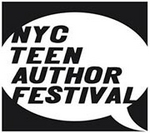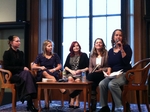
Last week was NYC Teen Author Festival, and since not all of you could attend this fantastic gathering of YA authors and their fans, I decided to attend as much as I could and give you the scoop. The idea for the festival was created 10 years ago by David Levithan, Sarah Mlynowski, and Daniel Ehrenhaft when they realized authors based in NYC should get together more often, and this was the sixth festival to have taken place! Events occured from Monday March 18th through Sunday March 24th.
This blog post will cover events on Tuesday, March 19th and Friday, March 22nd.
The next blog post, which will cover Saturday, March 23rd, is coming soon!
Tuesday, March 19th:
The Only Way Out is Through: Engaging Truth through YA
After work on Tuesday, I made my way to WORD bookstore in Brooklyn, where this panel was held. Although I was a tad late, I was able to get a seat and take in what these authors had to say about their works, which all had the common thread of dealing with the difficult issues or questioning a certain truth that teenagers face. First, each author read an excerpt of their book and then answered questions posed by David Levithan, each other or the audience. What I loved most about this panel is how evident it was that each author felt called to write about the life of teenagers who need their stories to be told.
Panelists:
Crissa Chappell, author of NARC
Tim Decker, author of THE PUNK ETHIC
Ellen Hopkins, author of TILT
Amy McNamara, author of LOVELY, DARK AND DEEP
Jessica Verdi, author of MY LIFE AFTER NOW
moderator: David Levithan, author of EVERY DAY
Discussion topics: Which came first: the research or the "truth?"; the heavy responsibility for this kind of writing; writing to overcome your own grief through the grief of a character; whether they read YA while they're writing; the use of dark humor to deal with grief; most major life experiences are cliche'd but everyone experiences them differently; glimpse of seeing the "normal" to see what is abnormal; the importance of opening up a dialogue; the worst censorship is self-censorship.
Friday, March 22nd Symposium:
He Said, She Said
The beginning of Friday's events was a fun exercise that was assigned to a bunch of authors. Each author had to take a "boy book" or "girl book" and rewrite it in some way to flip the genders. Some of the authors chose to create their own narratives based on a popular book (Gordon Korman flipped THE HITCHHIKER'S GUIDE TO THE GALAXY by creating an excerpt to his THE FASHIONISTA'S GUIDE TO THE GALAXY), and some authors chose to simply change the names (Carolyn Mackler chose to change the names in Judy Bloom's FOREVER, resulting in hilarity.)
He:
T.M. Goeglein, author of COLD FURY
Gordon Korman, author of UNGIFTED
Lucas Klauss, author of EVERYTHING YOU NEED TO SURVIVE AN APOCALYPSE
Michael Northrop, author of TRAPPED
She:
Susane Colasanti, author of KEEP HOLDING ON
E. Lockhart, author of REAL LIVE BOYFRIENDS
Carolyn Mackler, co-author of THE FUTURE OF US
Sarah Mlynowski, author of TEN THINGS WE DID (AND PROBABLY SHOULDN'T HAVE)
Leila Sales, author of PAST PERFECT
 Taking a Turn: YA Characters Dealing with Bad and Unexpected Choices
Taking a Turn: YA Characters Dealing with Bad and Unexpected Choices
The first panel of the Friday symposium explored books with characters who don't make the best choices and the consequences of those actions, which often drive the plot. This was one of my favorite panels because they focused about how the teenage years are sometimes the hardest; it's when everyone learns to act in the way (or not in the way) they've been taught to. Whether the protagonist is deciding whether to help cover up her boyfriend's crime, rationalize against not informing the authorities about a possible murder or choosing to have unprotected sex, each decision leads to a consequence, whether for better or worse.
Panelists:
Caela Carter, author of ME, HIM, THEM AND IT
Eireann Corrigan, author of THE BELIEVING GAME
Alissa Grosso, author of FEROCITY SUMMER
Terra Elan McVoy, author of CRIMINAL
Jacquelyn Mitchard, author of WHAT WE SAW AT NIGHT
Elizabeth Scott, author of MIRACLE
K. M. Walton, author of EMPTY
moderator: Aaron Hartzler, author of RAPTURE PRACTICE
Discussion topics: Characters that reason logically to the wrong conclusion; issues of making a decision to bring back power; short term gains vs. long term goals; the right decision doesn't have the immediate effect they're looking for; the drama of everyday life in high school; the bad choice is always more seductive; novels allow for empathy for the people who make these decisions; there is always the time to acknowledge what you've done and take that opportunity; the importance of avoiding the "cautionary tale"; the lesson you learn isn't always the one you expect.
 That’s So Nineteenth Century
That’s So Nineteenth Century
Who's a fan of historical fiction? What about the 19th century? These authors are admittedly OBSESSED with writing historical fiction, specifically with this age period. On this panel, these discussed their shared fascination and their researching techniques (which may or may not include breaking into historic locales.) But the final message was that even though their characters don't live in this time period (most at least), the purity of human emotion is timeless.
Panelists:
Sharon Cameron, author of THE DARK UNWINDING
Leanna Renee Hieber, author of the Magic Most Foul series
Stephanie Strohm, author of PILGRIMS DON'T WEAR PINK
Suzanne Weyn, author of DR. FRANKENSTEIN'S DAUGHTERS
Moderator: Sarah Beth Durst, author of VESSEL
Discussion topics: In the 19th century, what was happening with science made anything seem possible; writing about this time period isn't just about romanticizing history; the economic situation back then is very similar to right now; so much conflict in history; the importance of research, perhaps occasionally trespassing into old houses, visiting historic locations and wearing a corset; people have always been people; the problem of the formailty of language back then.
 Alternate World vs. Imaginary World
Alternate World vs. Imaginary World
Want to get away? These authors tend to do just that by creating different worlds or realities for their characters to go. But just how difficult is it to build a world that can stand on its own --- and even support a complicated plot? Each of these authors had to fit their narrative safely into a world or reality they've built and make sure that their rules are followed by their characters. Phew...that seems like a ton of work, but work with great rewards!
Panelists:
Sarah Beth Durst, author of VESSEL
Jeff Hirsch, author of MAGISTERIUM
Emmy Laybourne, author of MONUMENT 14
Lauren Miller, author of PARALLEL
E. C. Myers, author of QUANTUM COIN
Diana Peterfreund, author of FOR DARKNESS SHOWS THE STARS
Mary G. Thompson, atuhor of WUFTOOM
Moderator: David Levithan, author of EVERY DAY
Discussion topics: the architecture of the world before starting to write; parellel worlds are all about implications so extensive mapping; character inpsired the world; keeping an eye out for things that aren't actually yours; you can't help but be influenced; cultural touchstones are great landmarks.


